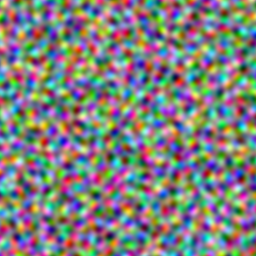Many games need noise. No, not that noise–this noise. Or better yet, this noise. More seriously, noise in this context refers to psuedo-randomly generated images that can be used for natural looking terrain generation1. Something like this:

Many games need noise. No, not that noise–this noise. Or better yet, this noise. More seriously, noise in this context refers to psuedo-randomly generated images that can be used for natural looking terrain generation1. Something like this:

In today’s post from Programming Praxis, the goal is to check if two cyclic lists are equal. So if you have the cycles ↻(1 2 3 4 5) and ↻(3 4 5 1 2), they’re equal. Likewise, ↻(1 2 2 1) and ↻(2 1 1 2) are equal. But ↻(1 2 3 4) and ↻(1 2 3 5) are not since they have different elements while ↻(1 1 1) and ↻(1 1 1 1) aren’t since they have different elements.
Yesterday, the daily programmer Subreddit had a post that mirrored a problem I’ve often seen before: the idea that if you follow first links ((With some caveats)) on Wikipedia, you eventually end with Philosophy. For example, if you follow the first links from Molecule, you get the following path:
Molecule → Atom → Matter → Rest Mass → Invariant Mass → Energy → Kinetic Energy → Physics → Natural Philosophy → Philosophy
It turns out that I won’t have any time this weekend after all. So technically, I have another day, but I’m not going to be able to finish this in 7 days. This actually works out, since in hindsight I don’t think that Betrayal at House on the Hill’s mechanics actually translate quite as directly to a Roguelike as at first I thought.
Not much in the way of screenshots today, but I did manage to add quite a lot of framework for content (which I’m going to spend tomorrow fleshing out). Now, the player has four stats (Might, Vigor, Intellect, and Sanity; I don’t think those were the original stats but I don’t have a copy at the moment to check). Each of them starts at a random value from 2 to 5. If any reaches 0, game over.
Also, to actually make use of said stats, there are two new kinds of definitions that you can stick in the data folder to automatically be used by the game: events and items.
Today was fairly productive, although even with that I managed to fall a bit behind. So it goes.
Today I’ve made it to where I optimally would have been back on Monday, had I actually planned what I was going to do (and not changed ideas and frameworks literally as I was starting to work).
The problem with starting with a (far) less common language is that you have to develop your own tools. That’s what I ended up spending most of the day doing in the case of Racket, although I think it ended up being a rather worthwhile endeavor.
This week marks 2013’s 7-day Roguelike (7DRL) challenge, a contest where entrants attempt to write an entire Roguelike in 7 days. Since I haven’t started my #1GAM a month for March (and since my successfully completed January game was a Roguelike as well), it seems like the perfect opportunity to kill two birds with one stone.
How many ways are there for a knight in chess from the top left to the bottom right of a chess board in exactly n=6 moves?